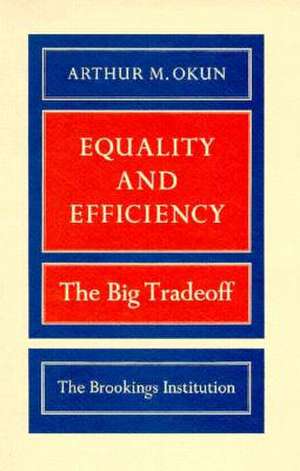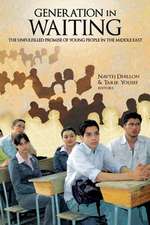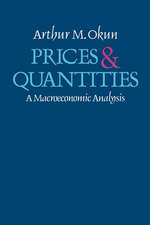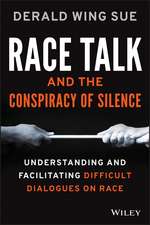Equality and Efficiency: The Big Tradeoff
Autor Arthur M. Okunen Limba Engleză Paperback – mai 1975
Contemporary American society has the look of a split-level structure. Its political and social institutions distribute rights and privileges universally and proclaim the equality of all citizens. Yet economic institutions, with efficiency as their guiding principle, create disparities among citizens in living standards and material welfare. This mixture of equal rights and unequal economic status breeds tensions between the political principles of democracy and the economic principles of capitalism. Whenever the wealthy try for extra helpings of supposedly equal rights, and whenever the workings of the market deny anyone a minimum standard of living, "dollars transgress on rights"—in the author's phrase.
In this revised and expanded version of the Godkin Lectures presented at the John F. Kennedy School at Harvard University in April 1974, Arthur M. Okun explores the conflicts that arise when society's desire to reduce inequality would impair economic efficiency, confronting policymakers with "the big tradeoff."
Other economic systems have attempted to solve this problem; but the best of socialist experiments have achieved a greater degree of equality than our mixed capitalist democracy only at heavy costs in efficiency, and dictatorial governments have reached heights of efficiency only by rigidly repressing their citizenry.
In contrast, our basic system emerges as a viable, if uneasy, compromise in which the market has its place and democratic institutions keep it in check. But within the existing system there are ways to gain more of one good thing at a lower cost in terms of the other. In Okun's view, society's concern for human dignity can be directed at reducing the economic deprivation that stains the record of American democracy—through progressive taxation, transfer payments, job programs, broadening equality of opportunity, eliminating racial and sexual discrimination, and lowering barriers to access to capital.
In this revised and expanded version of the Godkin Lectures presented at the John F. Kennedy School at Harvard University in April 1974, Arthur M. Okun explores the conflicts that arise when society's desire to reduce inequality would impair economic efficiency, confronting policymakers with "the big tradeoff."
Other economic systems have attempted to solve this problem; but the best of socialist experiments have achieved a greater degree of equality than our mixed capitalist democracy only at heavy costs in efficiency, and dictatorial governments have reached heights of efficiency only by rigidly repressing their citizenry.
In contrast, our basic system emerges as a viable, if uneasy, compromise in which the market has its place and democratic institutions keep it in check. But within the existing system there are ways to gain more of one good thing at a lower cost in terms of the other. In Okun's view, society's concern for human dignity can be directed at reducing the economic deprivation that stains the record of American democracy—through progressive taxation, transfer payments, job programs, broadening equality of opportunity, eliminating racial and sexual discrimination, and lowering barriers to access to capital.
| Toate formatele și edițiile | Preț | Express |
|---|---|---|
| Paperback (2) | 161.86 lei 6-8 săpt. | |
| Brookings Institution Press – mai 1975 | 161.86 lei 6-8 săpt. | |
| Brookings Institution Press – 30 apr 2015 | 179.34 lei 6-8 săpt. |
Preț: 161.86 lei
Nou
Puncte Express: 243
Preț estimativ în valută:
30.97€ • 33.12$ • 25.82£
30.97€ • 33.12$ • 25.82£
Carte tipărită la comandă
Livrare economică 17 aprilie-01 mai
Preluare comenzi: 021 569.72.76
Specificații
ISBN-13: 9780815764755
ISBN-10: 0815764758
Pagini: 124
Dimensiuni: 140 x 216 x 10 mm
Greutate: 0.16 kg
Editura: Brookings Institution Press
Colecția Brookings Institution Press
Locul publicării:United States
ISBN-10: 0815764758
Pagini: 124
Dimensiuni: 140 x 216 x 10 mm
Greutate: 0.16 kg
Editura: Brookings Institution Press
Colecția Brookings Institution Press
Locul publicării:United States
Descriere
Contemporary American society has the look of a split-level structure. Its political and social institutions distribute rights and privileges universally and proclaim the equality of all citizens. Yet economic institutions, with efficiency as their guiding principle, create disparities among citizens in living standards and material welfare. This mixture of equal rights and unequal economic status breeds tensions between the political principles of democracy and the economic principles of capitalism. Whenever the wealthy try for extra helpings of supposedly equal rights, and whenever the workings of the market deny anyone a minimum standard of living, "dollars transgress on rights"—in the author's phrase.
In this revised and expanded version of the Godkin Lectures presented at the John F. Kennedy School at Harvard University in April 1974, Arthur M. Okun explores the conflicts that arise when society's desire to reduce inequality would impair economic efficiency, confronting policymakers with "the big tradeoff."
Other economic systems have attempted to solve this problem; but the best of socialist experiments have achieved a greater degree of equality than our mixed capitalist democracy only at heavy costs in efficiency, and dictatorial governments have reached heights of efficiency only by rigidly repressing their citizenry.
In contrast, our basic system emerges as a viable, if uneasy, compromise in which the market has its place and democratic institutions keep it in check. But within the existing system there are ways to gain more of one good thing at a lower cost in terms of the other. In Okun's view, society's concern for human dignity can be directed at reducing the economic deprivation that stains the record of American democracy—through progressive taxation, transfer payments, job programs, broadening equality of opportunity, eliminating racial and sexual discrimination, and lowering barriers to access to capital.
In this revised and expanded version of the Godkin Lectures presented at the John F. Kennedy School at Harvard University in April 1974, Arthur M. Okun explores the conflicts that arise when society's desire to reduce inequality would impair economic efficiency, confronting policymakers with "the big tradeoff."
Other economic systems have attempted to solve this problem; but the best of socialist experiments have achieved a greater degree of equality than our mixed capitalist democracy only at heavy costs in efficiency, and dictatorial governments have reached heights of efficiency only by rigidly repressing their citizenry.
In contrast, our basic system emerges as a viable, if uneasy, compromise in which the market has its place and democratic institutions keep it in check. But within the existing system there are ways to gain more of one good thing at a lower cost in terms of the other. In Okun's view, society's concern for human dignity can be directed at reducing the economic deprivation that stains the record of American democracy—through progressive taxation, transfer payments, job programs, broadening equality of opportunity, eliminating racial and sexual discrimination, and lowering barriers to access to capital.
Notă biografică
Arthur Melvin Okun is widely considered among the most important macroeconomists of the twentieth century. Born in 1928, in Jersey City, New Jersey, he received his A.B. and his Ph.D. from Columbia University and went on to teach economics at Yale University. In the 1960s he served as a senior economist, member, and, finally, as chairman of the Council of Economic Advisers in the Kennedy and Johnson administrations.
When Okun left the CEA, he joined the Brookings Institution. In 1970, he cofounded, with George Perry, the Brookings Papers on Economic Activity (BPEA), which is still among the world's most prestigious economic journals and currently boasts sixteen Nobel Prize winners among its authors.
Known for his wit as well as his compassion, Okun reacted to surging inflation in the 1970s by developing an economic indicator he dubbed the Misery Index, which charted the well-being of Americans by combining the unemployment rate and inflation rate. In the years since, Okun's idea of indexing misery has been both repurposed and refined to track happiness and well-being across all sorts of indicators.
When Okun died unexpectedly at the age of just 51 in March 1980, he was hailed as an innovative and effective policy economist who was unique in holding the respect and admiration of both academic economists and practical politicians.
Okun is today remembered as an effective mediator between the realms of economic theory and analysis and the development and implementation of public policy. In this realm, Equality and Efficiency: The Big Tradeoff, with its difficult questions about the uneasy relationship between capitalism and democracy, is most certainly Okun's masterwork.
When Okun left the CEA, he joined the Brookings Institution. In 1970, he cofounded, with George Perry, the Brookings Papers on Economic Activity (BPEA), which is still among the world's most prestigious economic journals and currently boasts sixteen Nobel Prize winners among its authors.
Known for his wit as well as his compassion, Okun reacted to surging inflation in the 1970s by developing an economic indicator he dubbed the Misery Index, which charted the well-being of Americans by combining the unemployment rate and inflation rate. In the years since, Okun's idea of indexing misery has been both repurposed and refined to track happiness and well-being across all sorts of indicators.
When Okun died unexpectedly at the age of just 51 in March 1980, he was hailed as an innovative and effective policy economist who was unique in holding the respect and admiration of both academic economists and practical politicians.
Okun is today remembered as an effective mediator between the realms of economic theory and analysis and the development and implementation of public policy. In this realm, Equality and Efficiency: The Big Tradeoff, with its difficult questions about the uneasy relationship between capitalism and democracy, is most certainly Okun's masterwork.












